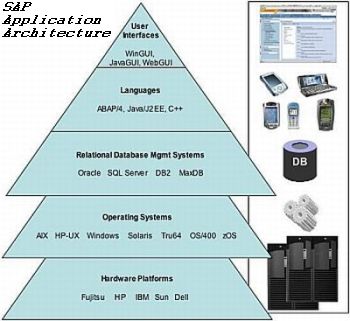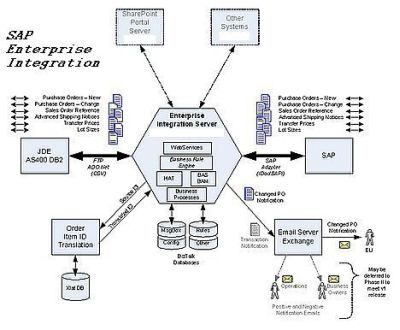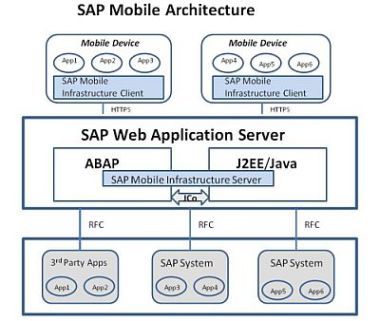G&G SAP Consultants are helping Small, Midsize, Large companies in SAP Support, Consulting with Offshore Development and Onshore Help from North Carolina, NC

G&G partner teams are engaged in SAP consulting projects providing either day to day SAP support and help, or SAP development from the ground for client companies all around the world. With corporate office and project management center in North Carolina (NC) in the east-coast USA, our SAP consultants and programmers are executing SAP ERP projects from offshore as well as on-shore, near shore. We are engaged in ECC / SAP R/3, SAP Business One, SAP Business All-in-One to SAP Business ByDesign in addition to BusinessObjects (for business intelligence BI), with quintessential SAP NetWeaver consulting and implementation for clients in various industries like manufacturing, shipping & transportation, food processing, financial, healthcare, retailing, chemical, mining and many more.
About SAP Consulting-Support and the company SAP
SAP was founded in the year 1972 by 5 former IBM engineers in Germany. It is the leading global provider of client-server business application solutions. It is the world's largest inter-enterprise software company and the world's fourth largest independent software supplier, overall.

SAP stands for "Systeme, Anwendungen, Produkte in der Datenverarbeitung" German for "SYSTEMS, APPLICATIONS AND PRODUCTS IN DATA PROCESSING." The full name of the parent company is SAP AG. The power of SAP lies in real time integration which links the business processes and applications of a company. The original SAP idea was to provide customers with the ability to interact with a common corporate database for a comprehensive range of applications. Gradually, the applications have been assembled and today many corporations including IBM and Microsoft are using SAP products to run their businesses. Presently tens of thousands of small, midsize and large companies are using SAP support and help from a number of SAP consulting vendors for integrating business applications internally as well as with external entities like supply chains. Many of the SAP consultants are implementing offshore SAP projects and onshore / onsite projects in almost all US states like in North Carolina (NC).
Traditional & Historical Products: SAP Consultants' perspective
SAP ERP package used to come mainly in two versions:
- The mainframe version SAP R/2
- The client-server version SAP R/3
SAP R/2 was the first integrated, enterprise wide package and was an immediate success. Towards the end of the 80's, client-server architecture became popular and SAP responded with the release of SAP R/3 (in 1992). This turned out to be a killer app for SAP development, especially in the North American region into which SAP expanded in 1988. SAP R/3 gives a clue to its functioning: the "R" stands for "real-time" data processing and the number 3 relates to the 3-tier architecture: database, application server and client (SAP GUI). Other major product offerings include:

- Advanced Planner and Optimizer(APO)
- Business Information Warehouse(BW)
- Customer Relationship Management(CRM)
- Supply Chain Management(SCM)
- Supplier Relationship Management(SRM)
- Human Resource Management Systems(HRMS)
- Product Lifecycle Management(PLM)
- Exchange Infrastructure(XI)
- Enterprise Portal(EP)
- SAP Knowledge Warehouse(KW)
SAP R/3 (SAP ECC 6.0) Functionality: Important for SAP support, help & consulting
SAP R/3 was SAP's integrated software solution for client/server and distributed open systems (SAP ECC 6.0 is the service oriented architecture [SOA] version with most functionality). SAP's R/3 was the world's most-used standard business software for client/server computing. It met the needs of a customer from the small grocer with 3 users to the multi-billion dollar companies. It was the former name of the main ERP software produced by SAP. In early 2000s SAP named it as mySAP ERP. SAP applications built around those earlier versions, provided the capability to manage financial, asset and cost accounting, production operations and materials, personnel, plants and archived documents. Earlier versions of SAP were arranged into distinct functional modules, covering the typical functions in place in an organization. The most widely used modules are:
- Financials and Controlling(FICO)
- Human Resources(HR)
- Materials Management(MM)
- Sales and Distribution(SD)
- Production Planning(PP)
Features of SAP Client-Server (as well as ECC) Architecture: Basics for SAP Consultants
- SAP client-server ran on a number of platforms and being a client-server based architecture, it utilized a three-tiered model:
- A presentation layer, or client, interfaces with the user.
- The application layer houses all the business-specific logic.
- The database layer records and stores all the information about the system, using its own proprietary language called ABAP(Advanced Business Application Programming). ABAP or ABAP/4 is a fourth generation language(4GL) geared towards the creation of simple yet powerful programs).
- SAP runs on several databases Oracle, Microsoft SQL Server, Informix, DB2 for UNIX, DB2/400, Adabas D. Since R/3 foundation, SAP has made significant development and installed thousands of systems. There are now more than 50,000 installations of SAP, in 125 countries, with more than 10-12 million users.
- SAP is scalable, customizable and highly suited for many types and sizes of organizations.
- Also offers a complete SAP development environment where consultants and developers can either modify existing SAP code or develop their own functions, whether reports or complete transactional systems using the SAP framework.
- SAP has several layers of abstraction. The Basis System (BS) includes the ABAP programming language, and is the heart (or the base) of the operations which should not be visible to the higher level or managerial users. From the manager's point of view the heart of the system are the application modules:

- Financial accounting
- Treasury
- Enterprise Controlling
- Investment management
- Production planning
- Materials management
- Plant maintenance and service management
- Quality management
- Project system
- Sales and distribution
- Human resources
Success of SAP: both Offshore and Onshore-onsite Implementation
SAP has not only gained acceptance, also widely installed, not just by large and very large companies, corporations but also by numerous smaller and midsize companies too. The reasons for this overwhelming success of SAP are:
- Replacing an out-dated and inefficient IT Architecture: In the beginning, computer systems were developed by individual departments to satisfy the requirements of that particular department. Then people realized that benefits could be had by linking these systems together, and interface heaven was born. There are some companies today with literally thousands of interfaces, each of which needs to be maintained. Sweeping them away and replacing them with an integrated system such as SAP can save much money in support.
- Enabling business process change: From the start, SAP was built on a foundation of process based practices. Although it sounds absurd, it is probably easier (and less expensive) to change a company's processes to adapt to SAP than the other way around. Many companies over the years have reported good success from combining a SAP implementation with a BPR project.
- Competitive advantage: Implementing SAP (both offshore and onshore-onsite) provides competitive advantage because of the following reasons:
- being able to accurately provide delivery promise dates for manufactured products (and meet them), particularly with the latest SAP applications,
- being able to consolidate purchase decisions from around the globe and use that leverage when negotiating with vendors,
- being able to place kiosks in stores where individual customers can enter their product specifications and then feed this data directly into it's production planning process which is pretty neat and unique.
Exploring a local or offshore SAP consulting company either in North Carolina (NC) or anywhere in the USA?
- Detailed business requirements analysis, free estimate, reliable SAP support & fast deployment, high quality, experienced SAP consultants team
- Global offshore labs with established development processes for lowering cost. Please look at the FAQ
- US customer references
- Toll-free number: 1-800-852-4145
- Email: info@GandGtech.com
Future of SAP Consulting & the Product
SAP is maintaining and increasing dominance over its competitors through a combination of the following useful strategies:
- embracing the Internet with SAP Business ByDesign, SAP Business One, SAP Business All-in-One, ECC, BusinessObjects, mySAP which are mostly open collaborative business environments of personalized solutions on demand.
- extending their solutions with CRM and other capabilities through efficient support and consulting.
- adding functionality to specific industry solutions.
SAP's competitive advantage over other e-Business vendors is mainly because of a three-dimensional integration:
- Integration of core business systems within an organization - front-end to back-end.
- Seamless flow of data between two organizations who transact with each other.
- Ability for participants in an industry to use any systems, and still communicate with other participants in that industry.
Implementing SAP is sometimes expensive (although not always), but the potential rewards can dwarf the costs (and have for many existing customers already). SAP AG is now the third largest software maker in the world, with tens of thousands of customers (including almost all of the world's top 500 top companies). The statistics (globally and in North Carolina [NC], G&G's home base) clearly show that SAP is the best thing that has happened to the IT industry in recent times and it is here to stay, for good and for long.
